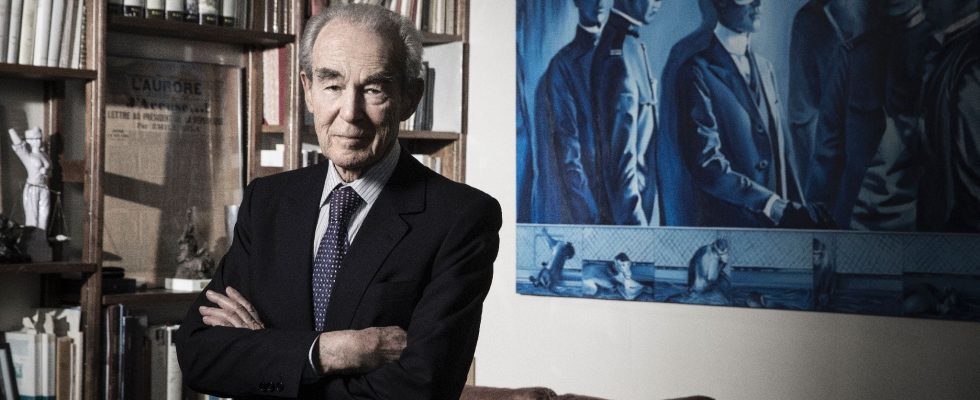First it was eyes and eyebrows. Then he was voice. To enter a room where Robert Badinter was was to immediately understand that the man was going to impress you. That is to say: strike your imagination. He entertained in his large office, surrounded by bookcases, where books coexist with trinkets, paintings, photos, and framed documents… Long and thin, the man already seemed to be the height of a legend. The verb alerts, despite great age. Always ready to explain the meaning of the objects placed on these dark wooden shelves, revealing here a trace of his history, there, a source of his inspiration.
“Old age is a shipwreck, but, for me, the water fortunately stopped there: I kept a very good memory!” the great lawyer told us, cheerfully, one day in 2021 when he welcomed us for an interview. Our eyes couldn’t help but want to see everything, and our ears, to have everything explained to them. This parchment, for example. “I never wanted a decoration. Of all the things I received, perhaps the most moving for me was this parchment. In 1981, I told my students who I was teaching at the Law school: ”when I have finished being a minister, I will come back to teach, and I will report to you. I will show you that I made the same speeches and did the same actions once in government. I went back there just before leaving my ministry. It was in the great amphitheater of Paris I, in Alésia. There were 200 students there, who cheered for me for 10 minutes. And they signed this parchment. It says: ”thank you, Mr. Badinter.” It’s one of my best memories in the world.”
Few ministers will have had such an impact on the recent history of France. Robert Badinter, a frail figure and statesman, is the voice of the abolition of the death penalty, with a mythological speech to the National Assembly. We also owe him – excuse me – the decriminalization of homosexuality (1982). And – less known – compensation for road victims (1985). “I would point out to you, moreover, that it is the only one called the Badinter law!”
Justice was his passion. His torment. He wanted it for the innocent, the victims, but also for the bastards. The lawyer – he was, incidentally, the lawyer for L’Express for 20 years – was one of those who never get over any snags. Of those who think that cheating on principles always weakens us. He nourished his passion at the source of French culture. Which he cherished. The revolution. Human rights. Condorcet. Victor Hugo. Emile Zola. Well displayed in one of its libraries, there was, in fact, the original “J’accuse”. That of L’Aurore, from January 1898, where the illustrious mustachioed man attacked “the abominable Dreyfus affair”, “a stain on the cheek of France”. “I hunted for this original for a long time,” Robert Badinter told us in his deep voice that moves stones. It was during our last interview, in April 2023.
Great secularist, great universalist
Another shelf, another object. Two old oxidized spoons. “Ah! I brought these back from a trip to Poland in the 1950s. While I was visiting the Auschwitz-Birkenau extermination camp, my foot tripped over one of them. And the curator of the camp museum, who accompanied me, said this terrible sentence to me: ‘Take them, we have so many.'” Robert Badinter said he never looked at spoons the way he used to. “It is the instrument of humanity. What allows us not to lap like animals.”
The camps were, in particular, the tomb of his father, his uncle, and one of his grandmothers. A young teenager at the start of the war, he was saved by the grace of a police officer, who provided him with false papers, as well as his brother and his mother. All three were hidden and sheltered until the end of the war in the Savoyard village of Cognin. He, who, at the time, “didn’t even understand what it meant to ‘be Jewish'”, he confided to Le Monde in 2018. It’s part of my being. I’m French, French Jewish , it’s inseparable. It’s not a word, it’s a lived reality.” A great secularist, a great universalist, Robert Badinter never embraced the multiculturalist and communitarian leanings of the new left, which distressed him.
Last object, about which we will speak little, as we know the couple is discreet and allergic to any personal intrusion: a photo of Elisabeth Badinter, his wife, at his side, during a visit to the Vatican. “You know, Elisabeth has so much courage. And she’s a great intellectual,” he told us, with the pride of a young lover.
Robert Badinter was a great servant of the State. With time and hindsight, the minister once hated by his adversaries had acquired over the years the status of an unassailable icon. And it was deserved. And that was so much the better. A great man has passed away. We have so little left.
